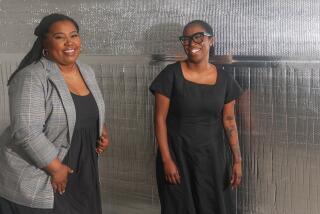Local scientists invent formula for stretchable batteries
- Share via
Chemical engineering researcher-turned-entrepreneur Lu Yin isn’t the kind of arresting public speaker who can blow anyone away with his charisma or magnetism. That mattered little on Friday, when Yin, 22, pitched his battery tech company, Ocella, to a panel of judges in the semi-final portion of San Diego’s Quick Pitch competition.
Now Ocella is charging into the final round — a pitch-off against nine other area startups where $50,000 is on the line — with the type of mind-bending technology that might make Yin’s lack of panache irrelevant. Perhaps the only real challenge for Yin will be explaining Ocella’s invention, a patented ink formulation for making long-lasting, stretchable batteries, in terms that regular folks, and not scientists, can grasp.
Basically, Yin and co-founder Rajan Kumar, 25, have discovered a way to turn everyday surfaces, think clothes and walls, into battery-powered devices. The ink they’ve engineered can be printed on to vests, jackets, shirts and the like using standard silk-screen printers. Or it can be painted on to walls.
“These guys didn’t invent e-textiles, by any means. They have an ink formulation process, which from I understand, can be incorporated into electronics that go into textiles,” said Russell Hall, a Tech Coast Angels member and investor who judged Friday’s semi-final event. “What really resonated with me is that this is very much the path to the future.”
And, if you believe the company’s co-founders, the future is now.
Yin and Kumar, who invented the technology at UCSD and are advised by experts in the field, claim to have a working prototype. They are potentially six months away from perfecting the ink formula so that, beyond stretching, its printable batteries would be washable and safe for skin contact.
“People have been working on stretchable electronics for a while, but their approach is usually using the structure of the battery itself. So you can create wrinkles on batteries so when you stretch the wrinkles reach each end,” Yin said.
Another existing approach involves what’s called an “island-bridge” configuration, where the non-stretchable functional part is connected through serpentine structures that deform during stretching, he said.
“But those things either are too expensive to manufacture or waste a lot of area due to the contact structures they require,” Yin said.
“With our formula, we make the battery internally stretchable.”
The main value, said Yin, is that Ocella can design batteries around products as opposed to designing products around batteries. The applications are vast, and range from extending the life of common devices to powering military communications in the field.
If you attach an Ocella battery to an Apple Watch band, it can increase the device’s capacity by 25 percent to 50 percent, Yin said as an example.
But direct-to-consumer-availability is not in the works. Of course the startup, which only officially branched off from a UCSD research project to a company this past March, is thinking along those lines. To start, however, it plans to forge partnerships with manufacturers and the military. Already the company has fielded interest from some of the largest apparel companies and consumer electronics brands, Yin said without disclosing specifics.
Hall believes this is the right approach for the startup.
“That’s a smart move,” he said of Ocella’s licensing approach. “Why wouldn’t you have Nike invest in the necessary technology to incorporate your patented ink process, versus trying to do it yourself?”
But there are potential obstacles. One being financing, and the other being the patented ink formula.
Ocella has raised roughly $100,000, and isn’t looking for venture capital right now. But that will change as soon as the company exits its research-and-development stage.
In addition, Ocella’s intellectual property is technically owned by UCSD, where it was developed, which means the company must negotiate licensing rights. The ownership structure complicates talks with would-be investors and partners.
“The IP is always the first thing we get asked about,” Yin said. “We’ve signed a letter of intent and we’re now talking about the terms to license the IP with exclusive rights.”
The IP issue will likely be a non-factor at the Oct. 5 Quick Pitch finals, where Ocella can win a portion of the $50,000 pot if Yin can craft a good narrative. He’ll have just two minutes to impress an auditorium of peers, investors and business leaders, who vote to determine the three companies that end up with the cash prizes.
“My advice is (for Yin) to try and entertain the audience, because this competition is about showmanship and inspiration, as much as anything,” Hall said. “He certainly has the necessary content to deliver. But he needs to, in my opinion, come out of his shell a little bit.”
Related:
San Diegan seeks to build a better Yelp
Business
[email protected] (619) 293-1840 Twitter: @jbruin







